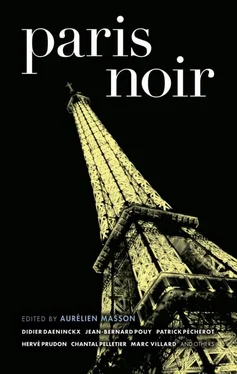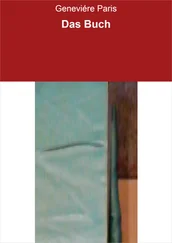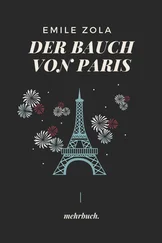Salim Bachi - Paris Noir
Здесь есть возможность читать онлайн «Salim Bachi - Paris Noir» весь текст электронной книги совершенно бесплатно (целиком полную версию без сокращений). В некоторых случаях можно слушать аудио, скачать через торрент в формате fb2 и присутствует краткое содержание. Город: New York, Год выпуска: 2008, ISBN: 2008, Издательство: Akashic Books, Жанр: Детектив, на английском языке. Описание произведения, (предисловие) а так же отзывы посетителей доступны на портале библиотеки ЛибКат.
- Название:Paris Noir
- Автор:
- Издательство:Akashic Books
- Жанр:
- Год:2008
- Город:New York
- ISBN:978-1-933354-63-7
- Рейтинг книги:3 / 5. Голосов: 1
-
Избранное:Добавить в избранное
- Отзывы:
-
Ваша оценка:
- 60
- 1
- 2
- 3
- 4
- 5
Paris Noir: краткое содержание, описание и аннотация
Предлагаем к чтению аннотацию, описание, краткое содержание или предисловие (зависит от того, что написал сам автор книги «Paris Noir»). Если вы не нашли необходимую информацию о книге — напишите в комментариях, мы постараемся отыскать её.
Paris Noir — читать онлайн бесплатно полную книгу (весь текст) целиком
Ниже представлен текст книги, разбитый по страницам. Система сохранения места последней прочитанной страницы, позволяет с удобством читать онлайн бесплатно книгу «Paris Noir», без необходимости каждый раз заново искать на чём Вы остановились. Поставьте закладку, и сможете в любой момент перейти на страницу, на которой закончили чтение.
Интервал:
Закладка:
Paris is a full city. Every morning I empty out my head: It’s like in the country — last day of November — a new blue sky improves — upon acquaintance — with a bare sky — advancing openly emptiness — on a glass tray — sea without spray — sea of ice — and the city disappeared — like in the fields — when time passes — the wind dies down and pain disappears — you take a chair — you sit there — you feel like painting that — nothing oppresses — caresses from beyond...
I’m not going out but I’m not the only one: cocoons, tribes, parties, cells — family cells or others — ghettoes, armored doors, double-paned, triple-locked, padlocked, barricades, everybody standing firm. Nobody moves. To go from my place to the chic neighborhoods, you have to climb on trees, go from branch to branch like the baron in the trees. I’m too acrophobic. Also too claustro to crawl through catacombs. So walk along the asylum, the big prison, the convents and hospitals. Closed spaces. What they call maximum-security areas. Maximum tension. That’s rue de la Santé, from one end to the other. Health Street. The sickest street in Paris.
It was a fine end of November, abnormally mild. People were swimming in Nice and Biarritz. In some Parisian neighborhoods a vacation mood must have been in the air, the kind of spontaneous fragrance that floods you with pleasure, makes you fall in love, and fills you with bliss in front of a store window or behind a behind. No fragrance like this in other neighborhoods. It wasn’t a good idea to go out today. Outside it was too empty in spots. Real black holes of antimatter. Elsewhere dripping with picturesque. There are days where this city is borderline bipolar. I had zero grams of iron in my blood and I should have known that one way or another this deficiency was going to be turned around — and dangerously so.
In detective novels, demons or buddies always catch up with the guy who has served time: He goes down again, falls again, and dives back into the life again. But like I said, that’s in books. In reality there’s less reality; more things happen inside your head than on the street. Dead things, for example, or old ideas — they don’t have a grave but keep on dying in bits of brain in the unsafe area. All this to say that there are very threatening days when I don’t feel right inside and my life is like an old tape you can’t rewind or even decipher because of the hieroglyphics, belches, obsolete sonnets, postmodern jargon, and intensity levels of collective or individual memory. I needed a technician who could stick his fingers into the softened hard drive of my decomputerized neurons and the visceral tar of my decorticated cortex — not an oncologist. But the vagaries of the medical calendar are such that I had an appointment here, not there, and I couldn’t avoid having to walk the whole length of rue de la Santé. For some it’s a quarantine line, a humanitarian corridor, Social Protection, for others it’s death row. This street stretches out under an infinitely high wall of millstones full of holes like sponges; it’s a street buried alive inside its walls. There I go from jolt to decay.
“A man can live on emotion, doctor, you can’t live on fatigue, you live under it. You can surf on emotion, you’re a flying fish, a land-air missile, but fatigue torpedoes you, it drowns you.”
“Go back home and get some rest.”
“Rest on who, on what?”
“Get out and see people.”
“People? Where am I supposed to go? Into a store window, as a mummy? Sit in a heated sidewalk café between two coat hangers? This city is a frustrating mirage. I never go out, doctor, unless you hand me a summons for medical tests. Outside, on street level, you’re closed in, locked up, walled up. You really want me to go out on the street, this street? In the jolted, ultra-vulnerable state you put me in? This street is a black sword, it goes through me backwards, it tears out my guts and my head, it’s a brutal street, it’s sick and crazy and dangerous. You saw the wall? Fifteen yards high, hundreds of yards long, nothing but big millstones and every single one of them wants to get out of the wall and jump on you. Behind the sticky wall a fucking ferocious neighborhood, a human zoo. An Indian reservation, no reservations necessary. A concentration camp universe. The back room, the rubbish, the unsold items, all the ugliness of the most beautiful city in the world. A secret, private collection where you can find everything that’s wrong. It jumps out at you through the walls. I wasn’t educated in violence, and I still don’t know what side I’m on. There are two sides on rue de la Santé, a wall side and a house side. The two sides clash. Those who have almost everything and those who’ve lost everything. This isn’t a Parisian street and I don’t think it ever goes anywhere.”
I don’t remember what he answered. Move along, there’s nothing to see.
“Rue de la Santé is a slit, a geological fault in the exhibitionist system, the opposite of the Operation Open Doors that the City of Lights is putting on right now. It cuts through the eastern part of the 14th arrondissement from north to south, a neighborhood they call residential, in contrast to commercial. In actual fact a neighborhood of nothing. A place dismissed, like a case dismissed. In the game of Monopoly it does not exist.”
“You’re fixating.”
This street, merry as an exhaust pipe, begins at Val de Grâce (military hospital) and ends on rue D’Alésia (defeat of the Gallic chieftain Vercingetorix against the Roman general Julius Caesar) at the intersection with Glacière, rebaptized Place Coluche (French comedian, died on a motorcycle at forty-two, founder of the Restos du Coeur soup kitchens); on the even-numbered side it passes by Cochin (civilian hospital), La Santé (only prison inside Paris), and Sainte-Anne (psychiatric hospital). The blind walls of these institutions, confined there until further notice, face deaf buildings anyone is entitled to find ugly, especially after the elevated line on boulevard Saint Jacques, as you get nearer to the outlying neighborhoods where they’ve built modest and low-income housing. Further up, between Arago and Port-Royal, more historical places — convents and religious or monastic institutions; they conceal their rich, permanent heritage behind cleaned-up walls and clumps of trees.
“I’m not fixating, doctor, life put me in the fix I’m in, I have to stay in my room at one end of the street, it shut me up, it hammered me down, and you’re at the other end, one foot in my grave and the other among the fortunate of the earth. I’m stuck with the whole length of this street that’s locked away behind surrounding walls oozing with misery and pain. Only cemetery walls look that much like the walls of asylums and prisons. You don’t know who these walls separate from whom, the living from the dead, the normal from the abnormal, honest people from criminals, the sick from the healthy, animals from human beings — they separate some from others, that’s all you have to know. All you have to do is imagine that behind the walls it’s more than a zoo, it’s a jungle, Africa, hell, and the ghetto of living. Nobody walks on rue de la Santé, and car traffic is rare. People who live here are invisible, protected by their anonymity. Their children don’t play on the sidewalk. Nobody would get the idea of moving here, facing the walls, except for Samuel Beckett who chose to live right across from the prison. He used to say he’d always be on the prisoners’ side, but most of the prisoners never read Beckett; he lived on the other side of the street, the other side of the walls. The walls have the thickness of reality, but on both sides of the walls life has the consistency of a fantasy. On rue de la Santé you can’t see anything but you can hear voices, groans, and shouts, moans, calls, frenzies, revolts, and death throes. You’re never sure. It’s like being at the edge of a deep forest. It’s like a no-man’s-land, the Mexican border or the Berlin wall. Good happy honest normal people never go near asylums, prisons, or hospitals. They have no idea the centuries-old convents even exist. They don’t know what kind of life is lived there, what vices are practiced, or what types of surprises they’re cooking up for us there.
Читать дальшеИнтервал:
Закладка:
Похожие книги на «Paris Noir»
Представляем Вашему вниманию похожие книги на «Paris Noir» списком для выбора. Мы отобрали схожую по названию и смыслу литературу в надежде предоставить читателям больше вариантов отыскать новые, интересные, ещё непрочитанные произведения.
Обсуждение, отзывы о книге «Paris Noir» и просто собственные мнения читателей. Оставьте ваши комментарии, напишите, что Вы думаете о произведении, его смысле или главных героях. Укажите что конкретно понравилось, а что нет, и почему Вы так считаете.












